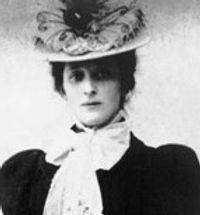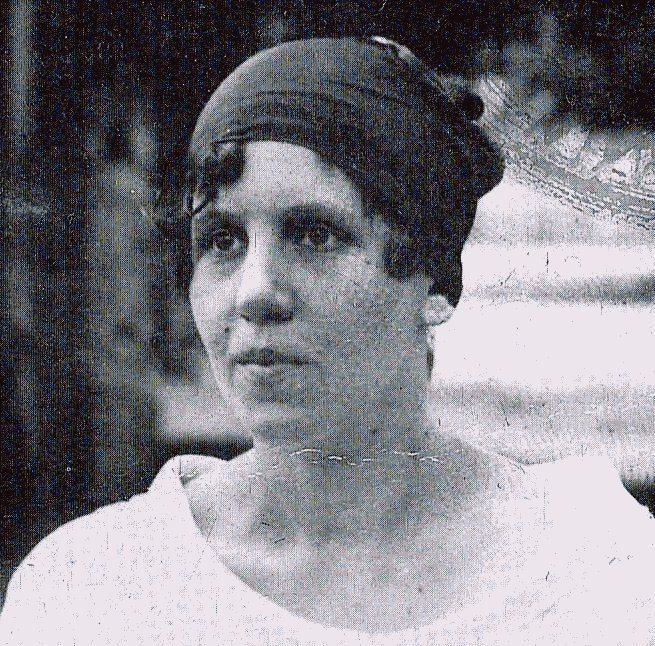- and the Search for the Miraculous
Alexandropol, Essentuki & Ekaterinodar

Alexandropol 1901
By en: H. F. B. Lynch (Armenia, travels and studies, 1901)
[Public domain], via Wikimedia Commons
Early in June 1917 Ouspensky was suddenly invited by telegram to come to Gurdjieff in his home in Alexandropol, on the distant Russo-Turkish frontier. Here he met Gurdjieff’s closest relatives: his father Ivan, his mother Yevdokia, his younger brother Dmitri Ivanovitch (and probably Gurdjieff’s wife Ulosifna Osipovna Ostrovska). After a fortnight Gurdjieff asked Ouspensky to return to Moscow and Petrograd and call the groups to new work with him in the south. Ouspensky faithfully and quickly discharged this trust: in mid-July he rejoined Gurdjieff, at Essentuki, on the northern foothills of the Caucasus, bringing Mme Ouspensky and her adult daughter Lenotchka Savitsky.

Sophia Ouspensky

Julia Ostrowska
Only thirteen pupils succeeded in congregating at Essentuki, and Gurdjieff worked intensively with them night and day. His techniques included fasting, acceleration of tempo, relaxation, cultivation of attention and bodily sensation, the ‘Stop Exercise’, and simple Movements. Ouspensky – replete with the theory of the Work – was suddenly and richly exposed to its praxis, in his fortieth year. After six weeks Gurdjieff ended this experiment and went to Tuapse, taking only Zaharoff. From this juncture Ouspensky – obscurely disappointed in his expectations – began to prefer Gurdjieff’s ideas over Gurdjieff himself.
Early in September 1917 Ouspensky returned to Petrograd alone to retrieve some belongings, finally leaving on 15 October (ten days before the Bolshevik revolution). He wintered with Gurdjieff in the Caucasus, successively at Uch Dere, Olghniki, and Essentuki, but received no instruction. On 12 February 1918, Gurdjieff issued a circular letter over Ouspensky’s signature calling the remainder of his Moscow and Petrograd groups south. By March forty people had assembled and Gurdjieff began a second period of concentrated work – significant as the last episode of Ouspensky’s real pupilship. As in the first Essentuki experiment, Gurdjieff’s emphasis was on practice not theory, and a variety of complex exercises were given. The sacred dances (in which Ouspensky had negligible interest or facility) implied for him that Gurdjieff was now tending towards religion. Concluding that Gurdjieff’s methods did not suit him, Ouspensky painfully resolved to part. In May 1918 he left Gurdjieff’s house and resumed writing A New Model of the Universe which romantically evoked his early travels and speculations.
Although Ouspensky continued to hold aloof from Gurdjieff throughout the summer of 1918 (while the Civil War progressively engulfed Essentuki) he loyally interested himself in Gurdjieff’s audacious plan to extricate his people over the Caucasus Mountains. Gurdjieff, with his party, left Essentuki, at the beginning of August 1918 and Ouspensky did not see him again for nearly two years. Political developments quickly overtook Ouspensky in Essentuki, stranding him there ten months with Mme Ouspensky, his stepdaughter Lenotchka Savitsky, and – very soon – his step-grandson Leonidas (‘Lonya’) Savitsky. Their ordeal between September and December 1918, entailing cold, hunger and typhoid, left Ouspensky with an ineradicable detestation of Bolshevism. In this stressful period, during which he courageously found work as a house-porter, schoolmaster, and librarian, Ouspensky first made long-term plans to teach Gurdjieff’s ideas.
In January 1919, Essentuki was liberated by the Volunteer Army under General Anton Ivanovitch Denikin: conditions eased, and (from Alexander Nikorovich Petrov in February and Olga de Hartmann in May) Ouspensky had news of Gurdjieff’s circumstances. Unwilling to rejoin Gurdjieff, Ouspensky decided that, once conditions permitted, he would emigrate to London and teach Gurdjieff’s System there. He chose England because he had friendships in literary and theosophical circles (e.g. with A. R. Orage, Carl E. Bechhofer-Roberts, and Mme A. L. Pogossky); because his book The Symbolism of the Tarot had been published in English; and above all because he accurately foresaw that no other European people would give a readier hospitality to Gurdjieff’s ideas.
"It is now two years since I last saw the New Age, and I do not know what is being said and thought and written in England and what you know. I can only guess. During this period we have lived through so many marvels that I honestly pity everybody who has not been here, everybody who is living in the old way, everybody who is ignorant of what we know. You do not even know the significance of the words 'living in the old way'. You do not have the necessary perspective; you cannot get away from yourselves and look at yourselves from another point of view."
Letter 1, Ekaterinodar, July 25, 1919
Letters from Russia, 1919. P D Ouspensky
Routledge & Kegan Paul, London 1978

Carl E. Bechhofer-Roberts - author of In Denikin's Russia And The Caucasus, 1919-1920
(By Ralph Straus [Public domain], via Wikimedia Commons)

Carl E. Bechhofer-Roberts
Between June 1919 and January 1920, Ouspensky spent his final precarious months in Russia attendant on the hard-pressed White forces. He left Essentuki with his family at the beginning of June and went, via Rostov-on-Don, to Ekaterinodar capital of the Kuban. During the autumn Ouspensky somehow found a way to send five articles to Orage, who published them in the New Age. Orage also commended him to Major ‘Frank’ (Francis William Stanley) Pinder, influential in Ekaterinodar as Head of the British Economic Mission to Denikin’s Volunteer Army; Pinder then helped by generously employing Ouspensky out of his own pocket, to write the Mission’s press summaries.

Ekaterinodar
Here in Ekaterinodar in September 1919, under grimly adverse conditions, Ouspensky began to teach his first Gurdjieffian group (a precocious initiative, which Gurdjieff had neither explicitly approved nor forbidden). Ouspensky was forty-one. He had recently declined two written invitations from Gurdjieff to rejoin him in Tiflis: instead in the autumn he accompanied Maj. Pinder and the Mission north to Rostov (leaving his family installed in a suburb of Ekaterinodar). In Rostov Ouspensky was joined by Zaharoff and resumed public lectures. In mid-December an unexpected visit from Bechhofer-Roberts, travelling as a freelance war correspondent, restimulated Ouspensky’s interest in England. By the close of December 1919, Bolshevik forces were at Rostov’s perimeter, and the trio – in imminent danger – dispersed: Bechhofer-Roberts found his way to Tiflis; Zaharoff died of smallpox in Novorossiysk; Ouspensky extricated his family from Ekaterinodar and brought them across the Crimea to Odessa, where they embarked to begin a lifetime’s exile.